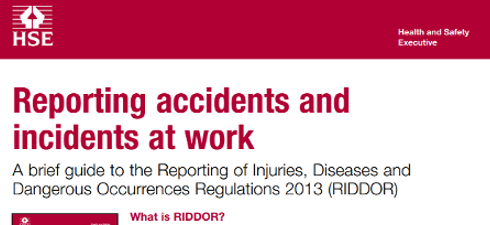See on Scoop.it – First Aid Training
The price for failing to report accidents or provide first-aid is potentially high
Under the Reporting of Injuries, Diseases and Dangerous Occurrences Regulations 2013 (RIDDOR), employers must report any work-related deaths, and certain work-related injuries, cases of disease, and near misses involving employees
Employers must also ensure that they provide suitably trained personnel and have adequate equipment and facilities for giving first-aid to employees who are injured or become ill at work. This is a requirement under the Health and Safety (First-Aid) Regulations 1981 (as amended) (FAR).
Changes to the law
Changes to both RIDDOR and FAR introduced on 1 October 2013 aim to simplify reporting requirements by removing some of the ambiguity that existed previously.
The mechanism for reporting under RIDDOR remains unchanged. Employers are still required to report relevant accidents to the Health and Safety Executive (HSE) within a reasonable time frame.
The main changes include:
a shorter list of ‘specified injuries’, instead of the ‘classification of major injuries’eight categories of ‘work related illnesses’, rather than 47 reportable industrial diseases.fewer ‘dangerous occurrences’ that require reporting
There is still a requirement under FAR to provide adequate first-aid cover, facilities and equipment. However the HSE will no longer approve first-aid providers. This means that employers themselves will need to make sure that training providers can prove their competence in relation to FAR.
Which trainer?
An advantage of the change in the regulations is that rather than running HSE approved courses, some training providers can now provide bespoke, industry specific first aid training. This makes it vitally important that they are appropriately qualified but it is also advisable to retain trainers with experience in your industry so that the training can be tailored to specific risks.
Training providers should be able to produce the following documentation to aid in establishing their competence and relevant experience:
a current First Aid at Work certificate (or exemption if applicable)a documented quality assurance plana brief of what the syllabus covers.
Training providers previously approved by the HSE are always a good option, as are trainers approved by organisations such as Ofqual.
Checklist
In relation to RIDDOR not much has changed. However, employers need to:
obtain a copy of the new legislation related to RIDDOR, which can be found at www.legislation.gov.uk/uksi/2013/1471/contents/made, and gives a list of the new categories for reporting – an invaluable tool for ensuring the right type of incident is reported;ensure that all H&S representatives and any H&S committees are aware of and trained in these new categories.
In relation to FAR, employers should ensure that:
trainers are competent in first aid and hold appropriate qualifications;training organisations have quality assurance plans for auditing their training;training providers demonstrate that they work to accepted training standards;first-aid courses are taught in accordance with recognised and accepted first aid practice;first-aid training courses are relevant to the organisation’s industry;appropriate certificates are issued to assessed students;
Employers would also be well advised to ask for recommendations or feedback from previous training sessions.
Comment
Companies have been successfully prosecuted for failing to report accidents in accordance with RIDDOR or for not reporting them in a timely manner. Getting it wrong can be costly. In R v Nicholls & Clarke Glass Ltd, the company was fined £11,200.
Prosecutions under FAR are rare. The case of R v TS (UK) Ltd resulted from a fatal accident where there were no first-aiders to give initial treatment prior to the arrival of paramedics. As well as receiving a £130,000 fine under the Health and Safety at Work Act. 1974, the company was also fined £10,000 for the first aid offence.
Making sure that there are appropriately trained first-aiders on hand will not only help you avoid such penalties but could also have a considerable impact on employees’ injuries or suffering.
Semra Zack-Williams is a Health & Safety Specialist and Stuart Jones is Head of Employment at Weightmans
Further information can be found at www.hse.gov.uk
See on www.cipd.co.uk

